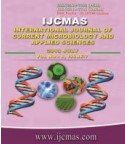


 National Academy of Agricultural Sciences (NAAS)
National Academy of Agricultural Sciences (NAAS)

|
PRINT ISSN : 2319-7692
Online ISSN : 2319-7706 Issues : 12 per year Publisher : Excellent Publishers Email : editorijcmas@gmail.com / submit@ijcmas.com Editor-in-chief: Dr.M.Prakash Index Copernicus ICV 2018: 95.39 NAAS RATING 2020: 5.38 |
The antimicrobial activity of bacteria isolated from fermenting cocoa water at a local farm at Supare-Akoko Ondo State, Nigeria against selected enteropathogenic bacteria was investigated. The fermentation was monitored for three days while the antimicrobial activity of the predominant isolates was evaluated using agar well diffusion method. The selected organisms were Klebsiella, pneumonia, Salmonella paratyphii, Staphylococcus aureus, Proteus mirabillis, Escherichia coli and Enterococcus faecalis. Bacteria that were isolated from the fermenting cocoa juice include Bacillus licheniformis, B. licheniformis, B. subtilis, B. cereus, Lactobacillus plantarum, L. brevis and Lactococcus lactis. The total viable count and lactic acid bacteria count of the fermenting juice increased from 7.94x103 cfu/ml and 3.98x102 cfu/ml to 1.25x106 cfu/ml and 3.16x105 cfu/ml respectively. The pH of the juice decreased from 5.90 to 4.30 while the temperature increased from 35oC to 41oC. The cell free supernatants of the dominant isolates, L. plantarum and L. brevis, inhibited all the pathogenic microbes. The highest and the lowest zones of inhibition were observed in S. aureus and E. faecalis cultures respectively. The antibacterial activity of these bacteria could be due to their ability to produce varieties of antimicrobial substances such as organic acids, hydrogen peroxide, carbon dioxide, and bacteriocins. Consumption of fermented cocoa juice could be an economical alternative approach to the use of antibiotics in treating infections caused by these pathogens.
 |
 |
 |
 |
 |